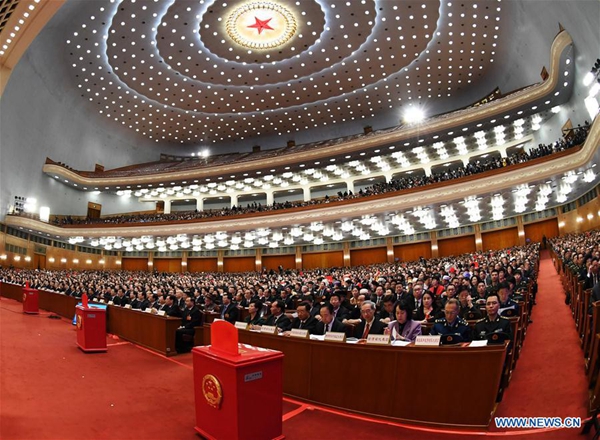The 13th National People's Congress, China's top legislature, and the 13th National Committee of the Chinese People's Political Consultative Conference, China's top political advisory body, are now gathering in Beijing for their first sessions. To observe these two meetings, there are a few things to keep in mind:

The third plenary meeting of the first session of the 13th National People's Congress (NPC) is held at the Great Hall of the People in Beijing, capital of China, March 11, 2018. [Photo/Xinhua]
First, China is a pragmatic country driven by planning. There are no head fakes or Tweet policies, just goals and schedules. Based on past performance, this should be your bible for telling you where and how China intends to grow.
Second, the attention being paid to social issues like poverty, housing, jobs, pollution and social benefits. China's income disparity declined last year which is a sharp contrast to developed countries. One of its primary goals is to wipe out abject poverty within the next three years. To understand how they will achieve this you need to look at about 7 million people who have developed individual, family and geographical area plans, to deal with the root causes of each individual's poverty.
Third, the continuation of the anti-corruption drive, the rebuilding of the Party from the grass roots up and China's ongoing efforts to reconcile Confucian and Communist values. The leaders are acutely aware that as a one-party system it must take responsibility for the recruitment and development of dedicated people. The responsibility of the government is greater than in a democratic country, because there is nowhere to hide failure.
It seems likely that the government will continue to try to tie its past to its present reality, as a way of creating a social glue which can bind society together and keep it resilient. There are many examples of how peoples and countries have been able to deal with difficult periods and they revolve around their belief in the systems and ideas that bind them together. This social resilience, collective belief, is an insurance policy against the unforeseeable and sometimes unavoidable.
Fourth, the emphasis on financial reforms, to deal with systemic financial risks, e.g. debt, and opening access to China's banking and finance systems to foreign involvement. The goal seems to create reciprocity for Chinese Fintech firms like Ant Financial, Alipay, WeChat, WeBank, where China has carved out substantial beachheads to gain access to outside markets.
There also seems to be a desire to light a fire under China's big banks who have enjoyed favorable government support but failed to provide the financial services to small and medium business entities, which the government is counting on to drive innovation and job creation.
Finally, yes look at the changes to the constitution, but with the caveat that the rush to judgement by the international community, and a few within China, may be premature. The facts are that the powers of the President pale in comparison to those of the chairs of the Standing Committee and the Military Commission, both of which only have informal retirement ages. It seems more likely that the government is sending a strong message that the ongoing reforms, referred to above, are here to stay and will be nurtured until they can stand on their own.
Understanding the differences in how democracies function and how China's system works is a must, or you will be easily dragged down by alarmists and conspiracy theorists, the same ones who have for the last 30 years been predicting the imminent fall of China.
The realities of governing are about planning and implementation of policies that can deliver individual safety, economic opportunity and reasonable social welfare. If you are afraid to walk the streets, send your children to school, or that your economic future and opportunity is in doubt or that there will be no way of recovering if you fall, then the dream has died.
We may live in a world where "post truth" and "fake news" is part of the vocabulary, but neither of these can be part of a sustainable world. Saying you doubt climate change does not make it less real, and tweeting "trade wars are good" and "easy to win" does not make it true.
It is time we try to look at things more clearly and on a longer more rational basis. How we feel is important, but it does not change the realities. It is time to cut through the fog of noise we face daily and see the facts and thereby the truth. Keep these things in mind and perhaps China's two sessions will make more sense and be more interesting.
Einar Tangen is a political and economic affairs commentator, author and columnist.
Source: China.org.cn